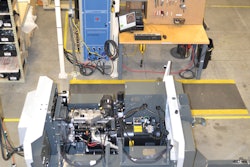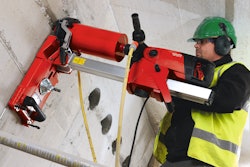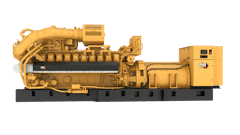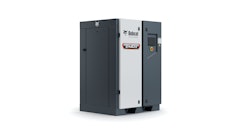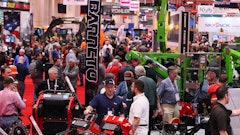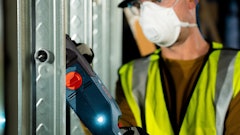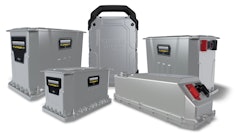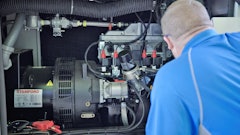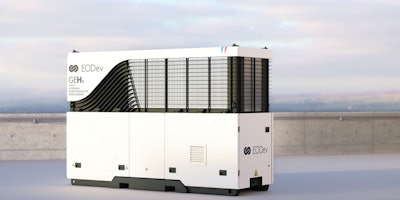
Temporary power is essential on many worksites to meet the electrical demands of the project. The most common source of temporary power, the diesel generator, is also a top source of carbon emissions. Contractors and other companies looking to shrink their carbon footprint and meet the sustainability goals of owners or investors must begin to reduce their reliance on diesel generators and incorporate earth-friendlier alternatives into their equipment fleet.
Thanks to recent innovations in temporary and backup power equipment, rental providers are now able to offer efficient, reliable solutions that curb fuel use, reduce or eliminate emissions and deliver additional benefits such as quieter operation and longer maintenance intervals. These solutions include propane generators, hydrogen generators, battery energy storage systems and, most important, hybrid solutions that pair generators with energy storage.
Battery energy storage systems: Reducing generator runtime
Energy storage is changing the future of power. A battery energy storage system (BESS) captures energy from an energy source, whether it’s the power grid, a solar array or a generator, and stores it for later use. These units are comprised of rechargeable high-density lithium batteries, inverters and load-sensing technology. When paired with a generator, they dramatically reduce generator runtime, thereby slashing fuel use and emissions.
As the generator runs, it charges the BESS batteries. When demand for power is low, the BESS automatically shuts down the generator and takes over the load. Only when the batteries need recharging or the power demand increases does the BESS instruct the generator to begin operating again.
A BESS can serve as a standalone temporary power solution for small loads in place of a generator. Rental customers can also choose a hybrid energy system that houses a BESS and a generator in one mobile platform.
Curbing emissions and noise
A BESS is 100 percent emissions free. When a diesel generator is paired with a BESS, emissions of greenhouse gases and other air pollutants plummet. By minimizing generator runtime, a hybrid power system can curtail emissions by as much as 80 percent compared to a diesel generator used alone.
Noise reduction is another major benefit of hybrid power solutions. Powering equipment with batteries instead of a diesel generator can decrease noise levels by up to 90 percent, which protects workers’ hearing. Quieter operation can also boost productivity by allowing companies to perform work at the most convenient hours, such as early in the morning or after the sun has lost its heat, despite any local noise ordinances.
Cutting fuel use and operating costs
Generators are typically sized for the maximum load and run significantly underloaded most of the time. Adding a BESS can result in major fuel savings—as much as 80 percent—by reducing runtime. In addition, because hybrid solutions offer more capacity than a generator alone, they often allow customers to rent smaller generators, which leads to additional fuel savings as well as lower rental costs.
Reduced runtime also decreases generator maintenance. Longer service intervals mean less downtime and, for generators that run on fossil fuel, lower consumption of oil and filters—a sustainability bonus. A BESS itself requires minimal maintenance.
Cleaner generators for greener hybrid solutions
Adding a BESS to a diesel generator represents a major step forward in limiting the effects of these generators on the environment. For companies with more aggressive sustainability goals, pairing a BESS with a cleaner-burning generator, such as a propane or hydrogen generator, can further reduce emissions or even eliminate them.
Propane generators, which can often also be configured to run on natural gas, are gaining traction. Burning propane produces 17 percent less carbon dioxide than burning diesel. Propane generators are also quieter than their diesel counterparts. Because they require minimal oil and no fuel filters, their operating costs are lower.
Other advantages of propane generators: Propane exhaust is virtually odorless and colorless, and propane can be stored for many years, while diesel degrades over time.
For a 100 percent emissions-free temporary power solution, equipment renters can pair a BESS with a hydrogen generator. Hydrogen fuel cell technology has enabled the development of generators. These machines emit no greenhouse gases or particulate matter. Water and warm air are the only byproducts. On top of being clean burning, they are quiet, reliable and durable.
As the newest additions to the market, hydrogen fuel cell generators currently cost more than other generators to rent and operate. As adoption grows, however, prices are likely to fall. Likewise, the price of hydrogen fuel should drop as the distribution network for this fuel expands.
Choosing a temporary power source
With the advent of battery energy storage systems and greener alternatives to diesel generators, rental customers now have more temporary power choices than ever before. Hybrid solutions and propane and hydrogen generators help companies close the sustainability loop by powering electric equipment and vehicles with cleaner power.
Given the breadth of options available, the task of choosing a solution that meets the power and sustainability requirements of a project, as well as the project budget, can be daunting. Rental providers with deep knowledge of these solutions and their applications can guide customers to the equipment that will best serve their needs.





